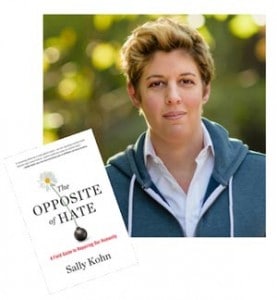
Sally Kohn
An unfortunate topic
The Opposite of Hate: A Field Guide to Repairing Our Humanity
Sally Kohn
Workman Publishing, 2018
Wendy Juren Auerbach
To be honest, the copy of The Opposite of Hate: A Field Guide to Repairing Our Humanity by Sally Kohn languished on my pile of books to read longer than I anticipated. The reason, as I discovered later in Kohn’s book—it is easier to cling to one’s own biases and stew about the other side. I doubted that this book could help boost my optimism, but I was wrong.
No matter what side of the political spectrum you occupy, the cacophony of news and opinion is deafening and seems to be evolving into an epidemic of hate. Finding a safe place for civil discussion these days is like landing on an oasis in the desert. But Sally Kohn in her book encourages us to stop
taking sides and start a conversation, and she brings a unique perspective to this topic with a career that has touched the entire political spectrum. As an openly gay woman, she has been a strong voice for LBGT and progressive causes, as well as an active community organizer. Currently a columnist and a political commentator for CNN and MSNBC, a key element of Kohn’s resume includes a spot as a former liberal commentator on the Fox Network.
Hate is a vast subject and underpins so many past and present events. The Opposite of Hate breaks hate down into very manageable chapters exploring what hate is, how and why we hate, unconscious hate, hate related to genocide, and how hate has permeated social institutions. Kohn’s very readable cocktail includes her own personal experiences and biases, many extensive studies and research on hate, as well as profiles of former terrorists and white supremacists, making The Opposite of Hate an
engaging journey of discovery—especially given the topic. Kohn does not give herself a free pass, and her honest observations as she bravely explores what most of us would rather ignore, are powerful.
Throughout the book, Kohn stresses the importance of making connections in order to understand the many aspects of hate. In the book’s final chapter, The Journey Forward, however, she does not
tell us to change who we are, nor does she whitewash the fact that overcoming hate is hard.
“The opposite of hate also isn’t some mushy middle zone of the passionate centrism. You can still
have strongly held beliefs, beliefs that are in strong opposition to the beliefs of other people, and still treat those others with civility and respect. Ultimately, the opposite of hate is the beautiful and powerful reality of how we are all fundamentally linked and equal as human beings. The opposite of hate is connection.”
Taking the time to read The Opposite of Hate is well worth it. Our current environment of vitriol is corrosive in so many ways, especially as an example to the generation now growing up amidst all of it.
Kohn’s final takeaway is that we all have the power to do something.
“Deciding to turn away from hate and pursue its opposite is a daily decision and a daily act, one we must constantly recommit to as vigorously as possible, in spite of all the obstacles. But the good news is, it’s possible.”
Sally Kohn will be at the Sandler Family Campus on Thursday, November 29 at 12 pm. For information, contact Callah Terkeltaub at cterkeltaub@ujft.org or 757-321-2331.
Wendy Juren Auerbach is the past chair of the Holocaust Commission of the United Jewish Federation of Tidewater.
